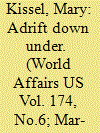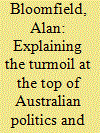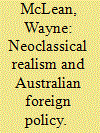| Srl | Item |
| 1 |
ID:
115067


|
|
|
|
|
| Publication |
2012.
|
| Summary/Abstract |
John Winston Howard wasn't just voted out of office after a remarkably steady eleven-and-a-half-year stretch atop Australian politics in November 2007. He lost the prime minister's job to Kevin Rudd, a cheerless career bureaucrat with a skimpy parliamentary record, and lost his local seat to a toothy blond broadcaster with no political experience at all. Yet today the young and the old mob Howard when he wanders out in Sydney, wanting an autograph and a snap with the seventy-two-year-old. They realize that Australia's current leaders have veered the country away from the steady, prosperous path it was on for the past three decades, and in addition to feeling nostalgia for better days they want someone to steer their country back on track.
|
|
|
|
|
|
|
|
|
|
|
|
|
|
|
|
| 2 |
ID:
148498


|
|
|
|
|
| Summary/Abstract |
Five Australian prime ministers have come and gone in the past five years. The turbulence at the top, however, is likely over because Malcolm Turnbull, the leader of the conservative Liberal Party, is likely to remain in the prime minister’s office for several years. This article first provides some background to the Australian political system before explaining why so prime ministers came and went between 2010 and 2015. It then considers the implications of all this for Australian foreign policy. The argument is simple: despite the constant personnel changes at the pinnacle of power there are actually few ‘deep’ differences between the two parties – or their leaders – in the realm of foreign policy. There are some differences, of course, so the final section considers the potential for changes in several policy-areas – climate change, national security, trade policy and asylum seekers – but any potential changes are judged likely to be minor and incremental. The article then finishes with consideration of what all of this means for India and, again, the conclusion is simple; it is likely to be ‘business as usual’ as Canberra tries to steadily improve the bilateral relationship in both security and economic terms.
|
|
|
|
|
|
|
|
|
|
|
|
|
|
|
|
| 3 |
ID:
143654


|
|
|
|
|
| Summary/Abstract |
This article uses neoclassical realism to explore how foreign policy elites in Australia frame domestic debates so as to prevent certain ideas interfering with security responses. It does this by presenting a typology that seeks to understand elite dynamics in Australia by capturing three different elite responses – dilution, deflection and inflation. Taken together, these explain how elites mitigate potentially problematic domestic policy contests by pulling ideas towards the centre of debates, and marginalizing others, depending on the issue involved.
|
|
|
|
|
|
|
|
|
|
|
|
|
|
|
|